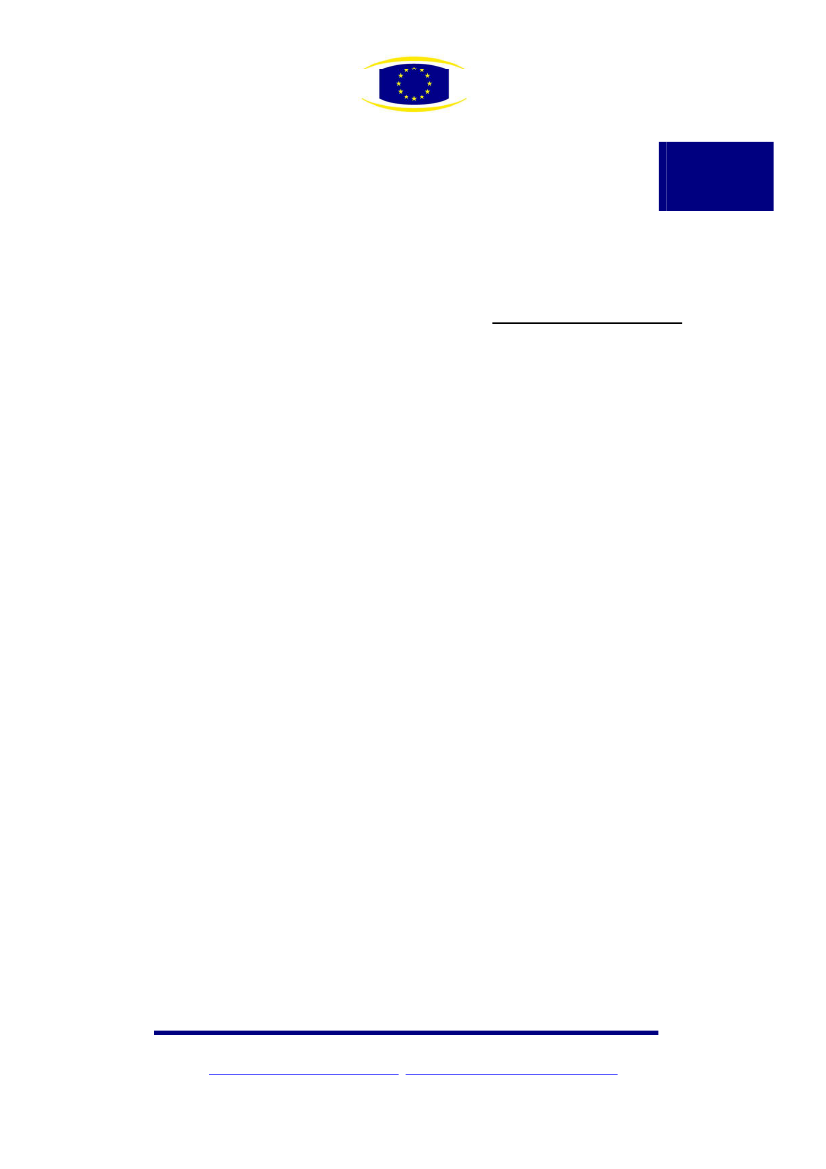Det Udenrigspolitiske Nævn 2013-14
UPN Alm.del Bilag 90
Offentligt
COU CIL OFTHE EUROPEA U IO
EN5425/14(OR. en)PROVISIO AL VERSIOPRESSE 14PR CO 1
PRESS RELEASE3288th Council meeting
Foreign AffairsBrussels, 20 January 2014PresidentCatherine AshtonHigh Representative of the Union for Foreign Affairs andSecurity Policy
PRESSRue de la Loi 175 B – 1048 BRUSSELS Tel.: +32 (0)2 281 6319 / 6319 Fax: +32 (0)2 281 8026
5425/14
1
E
PROVISIO AL VERSIO
20 January 2014
Main results of the Council
IranAs part of the implementation of the Joint Plan of Action agreed by Iran and the E3/EU+3, whichentered into force today, the Council suspended certain EU restrictive measures against Iran for aperiod of six months. By putting the sanctions relief in place, the EU has implemented its part of thefirst step towards a comprehensive solution to address concerns about the Iranian nuclearprogramme."We aim to start negotiations about a comprehensive solution with Iran in February",said EU High Representative for Foreign Affairs and Security Policy, Catherine Ashton. Thesuspension took effect today.Central African RepublicThe Council is deeply concerned by the extreme insecurity and instability in the Central AfricanRepublic (CAR). It commended the rapid deployment by the African Union of the InternationalSupport Mission in the CAR (MISCA) and the support given to it by France's Operation Sangaris."We've been fully mobilized since the beginning of the crisis to support the efforts of our Africanpartners,"Catherine Ashton said after the Council.So as to step up the European involvement in the CAR, the Council gave political approval for apossible EU military operation and approved the related crisis management concept. The operationcould contribute to providing a safe and secure environment in the Bangui area, with a view tohanding over to the African Union, taking into account U0 Security Council resolution 2127."We'll move forward with operational planning, under our fast track procedures,"said the HighRepresentative.A donors conference organized today by the EU and the U0 collected € 366 million in pledges forhumanitarian aid to the Central African Republic.SyriaMinisters discussed the crisis in Syria and fully supported the peace conference on Syria on 22January. The Geneva conference should be the first step in a process that will lead to a politicalsolution to the conflict. The Council reiterated that the only solution to the conflict is a genuinepolitical transition, based on the full implementation of the Geneva Communiqué of 30 June 2012and preserving the sovereignty, independence, unity and territorial integrity of Syria.
5425/14
2
E
PROVISIO AL VERSIO
20 January 2014
CO TE TS1
PARTICIPA TS................................................................................................................................ 5
ITEMS DEBATEDSouthern neighbourhood ...................................................................................................................... 7- Syria................................................................................................................................................... 7- Egypt................................................................................................................................................ 10Middle East peace process ................................................................................................................. 10Afghanistan ........................................................................................................................................ 11Iran ..................................................................................................................................................... 14Russia ................................................................................................................................................. 14Ukraine............................................................................................................................................... 15Central African Republic ................................................................................................................... 15South Sudan ....................................................................................................................................... 19
1
ŸWhere declarations, conclusions or resolutions have been formally adopted by the Council, this is indicatedin the heading for the item concerned and the text is placed between quotation marks.ŸDocuments for which references are given in the text are available on the Council's Internet site(http://www.consilium.europa.eu).ŸActs adopted with statements for the Council minutes which may be released to the public are indicated byan asterisk; these statements are available on the Council's Internet site or may be obtained from the PressOffice.
5425/14
3
E
PROVISIO AL VERSIOOTHER ITEMS APPROVEDFOREIG0 AFFAIRS––––––––
20 January 2014
Relations with Serbia............................................................................................................................................. 21Relations with Russia ............................................................................................................................................ 21Relations with Iraq ................................................................................................................................................ 21Restrictive measures - Libya ................................................................................................................................. 21EU Special Representative for the South Caucasus............................................................................................... 21EU Special Representative .................................................................................................................................... 21Relations with Georgia and Albania...................................................................................................................... 22Restrictive measures - Belarus .............................................................................................................................. 22
RESEARCH––Joint Technology Initiatives - Budgetary discharge .............................................................................................. 22EU-Russia cooperation agreement in science and technology .............................................................................. 22
APPOI0TME0TS–Economic and Social Committee .......................................................................................................................... 23
5425/14
4
E
PROVISIO AL VERSIO
20 January 2014
PARTICIPA TS
High RepresentativeMs Catherine ASHTONBelgium:Mr Didier REYNDERSBulgaria:Mr Kristian VIGENINCzech Republic:Mr Jan KOHOUTDenmark:Mr Holger K. NIELSENGermany:Mr Frank-Walter STEINMEIEREstonia:Mr Urmas PAETIreland:Mr Eamon GILMOREGreece:Mr Evangelos VENIZELOSSpain:Mr José Manuel GARCIA-MARGALLOFrance:Mr Laurent FABIUSCroatia:Ms Vesna PUSIĆItaly:Ms Emma BONINOCyprus:Mr Ioannis KASOULIDESLatvia:Mr Edgars RINKĒVIČSLithuania:Mr Linas A. LINKEVIČIUSLuxembourg:Mr Christian BRAUNHungary:Mr Zsolt NÉMETHMalta:Mr George VELLAetherlands:Mr Pieter de GOOIJERAustria:Mr Sebastian KURZ
High Representative of the Union for Foreign Affairs andSecurity PolicyDeputy Prime Minister and Minister for Foreign Affairs,External Trade and European AffairsMinister for Foreign AffairsMinister for Foreign AffairsMinister for Foreign AffairsFederal Minister for Foreign AffairsMinister for Foreign AffairsTánaiste (Deputy Prime Minister) and Minister forForeign Affairs and TradeDeputy Prime Minister and Minister for Foreign AffairsMinister for Foreign AffairsMinister for Foreign AffairsFirst Deputy Prime Minister and Minister for Foreign andEuropean AffairsMinister for Foreign AffairsMinister for Foreign AffairsMinister for Foreign AffairsMinister for Foreign AffairsPermanent RepresentativeParliamentary State Secretary, Ministry of Foreign AffairsMinister for Foreign AffairsPermanent RepresentativeFederal Minister for European and International Affairs
5425/14
5
E
PROVISIO AL VERSIOPoland:Mr Radosław SIKORSKIPortugal:Mr Rui MACHETERomania:Mr Titus CORLĂȚEANSlovenia:Mr Karl ERJAVECSlovakia:Mr Miroslav LAJČÁKFinland:Mr Erkki TUOMIOJASweden:Mr Carl BILDTUnited Kingdom:Mr William HAGUE
20 January 2014
Minister for Foreign AffairsMinistro de Estado, Minister for Foreign AffairsMinister for Foreign AffairsDeputy Prime Minister, Minister for Foreign AffairsDeputy Prime Minister, Minister for Foreign AffairsMinister for Foreign AffairsMinister for Foreign AffairsFirst Secretary of State, Secretary of State for Foreign andCommonwealth Affairs
Commission:Mr Andris PIEBALGSMs Kristalina GEORGIEVAMr Štefan FÜLE
MemberMemberMember
5425/14
6
E
PROVISIO AL VERSIOITEMS DEBATEDSouthern neighbourhood- Syria
20 January 2014
The Council held a discussion about the situation in Syria and the preparations for a peaceconference on 22 January. It adopted the following conclusions:"1.The EU fully supports the peace conference on Syria, which will take place on 22 Januaryin Switzerland. The Geneva conference should be the first step in a process that will lead toa political solution to the conflict. The EU reiterates that the only solution to the conflict isa genuine political transition, based on the full implementation of the GenevaCommuniqué, and preserving the sovereignty, independence, unity and territorial integrityof Syria. The EU commends the efforts of the Joint Special Representative Brahimi and histeam.The EU recalls that the objective of the conference is the formation by mutual consent of aTransitional Governing Body (TGB) with full executive powers, including over security,military and intelligence. Any elections in Syria should only take place within theframework of the Geneva Communiqué. The regime, as well as the opposition, mustcommit themselves to the full implementation of the Communiqué as a matter of urgency,and demonstrate that commitment through their actions. The EU calls on all parties toengage constructively in a genuine negotiation.The EU welcomes the invitation sent by the UN Secretary General to the NationalCoalition of Syrian Revolutionary and Opposition Forces (SOC), commends its decision toparticipate in the conference and welcomes its commitment to establish an inclusive andrepresentative delegation including women. The EU stands ready to assist the oppositiondelegation led by the SOC in needs that might arise as part of the negotiation.The EU considers it important throughout the Geneva process to also work on promotingconfidence building measures that would directly benefit the local population and increasethe chances of the conference's success. Confidence building measures could for examplebe agreements on local ceasefires, lifting of sieges on certain urban areas so to allow forimproved humanitarian access, and the release of arbitrarily detained prisoners or theexchange of detainees.
2.
5425/14
7
E
PROVISIO AL VERSIO3.
20 January 2014
The EU remains gravely concerned with the continuing and indiscriminate bloodshedamong the civilian population and calls for the cessation of all violence to allow urgenthumanitarian access on the ground. It strongly condemns the regime’s escalatingindiscriminate attacks, including use of SCUD missiles, barrel bombs, air and artillerystrikes and brutality on the ground, notably in Aleppo. The regime bears the primaryresponsibility for the conflict and its actions on the ground are undermining the potentialfor genuine political transition and fuelling extremism.The EU shares growing concern about the spread of extremism and extremist groups,including ISIL and Jabhat al-Nusra. Their involvement in the conflict poses a threat to thepeace process, the territorial integrity of Syria and to regional and international security.The EU welcomes the SOC's condemnation of all forms of terrorism and extremism, andthat the moderate opposition is opposing extremist groups.As the majority of Syrians reject violence, all efforts must be channelled towards thecommon goal of rebuilding the country, rid it of its authoritarian past, preserve itstraditions of inter-religious, inter-ethnic and cultural co-existence, and ensure full respectof all human rights. The EU is concerned about the plight of all vulnerable groups, andethnic and religious minorities, including Christians.
4.
The EU has consistently supported civil society groups, with a view to supporting apolitical solution to the conflict. Member states have also provided assistance and capacitybuilding, including through recent events such as the Cordoba conference, and willcontinue to do so throughout the Geneva process.The EU stresses the importance of an inclusive Syrian peace process and supports theactive and meaningful participation of women and civil society in the overall politicaltransition process. This will help facilitate an inclusive and sustainable outcome that meetsthe needs of the Syrian people. The EU encourages both parties to appoint women to theirGeneva II delegations as their involvement in the process leading to a political settlementis crucial for its sustainability. The EU also calls upon the UN to facilitate the participationof women's groups and civil society organisations at Geneva, in a way that supports thetwo official delegations to the talks and into the peace process, in line with UNSCresolutions 1325 and 2122. In this context, the EU welcomes the meeting “PromotingWomen’s Engagement in the Syrian Political Process” convened by UN Women and theNetherlands on the 12-13 of January.
5.
5425/14
8
E
PROVISIO AL VERSIO6.
20 January 2014
The EU will continue to defend human rights and will remain active in ensuringaccountability for the widespread and systematic violations and abuses of human rights andinternational humanitarian law perpetrated in Syria. The EU reiterates its call on the UNSecurity Council to urgently address the situation in Syria in these aspects, including on apossible referral to the International Criminal Court as requested in the Swiss letter to theSecurity Council of 14 January 2013. The EU recalls that all those responsible for crimesagainst humanity and war crimes must be held accountable. The EU reaffirms its supportto the Independent International Commission of Inquiry for Syria established by theHuman Rights Council.Following the Kuwait II Donors’ Conference on 15 January where the EU and its MemberStates pledged € 550 million, and in line with the European Council conclusions of 20December 2013, the Union will continue to urge for progress and engage its partners in theframework of the UN-led High Level Group on humanitarian challenges.. Humanitarianaid and access cannot, and should not, be taken hostage of military tactics and politicalnegotiations. Therefore, the EU calls on all the parties to the Syrian conflict, in particularthe Syrian government to immediately implement in full the provisions of the PresidentialStatement of the UN Security Council of 2 October 2013. Considering the unprecedentedscale and nature of the crisis, the EU calls for a humanitarian resolution by the UNSC. TheEU urges all parties to the conflict, in particular the Syrian government, which has thegreatest responsibility in enabling humanitarian access, to take decisive steps to facilitatesafe, unhindered and immediate access to all people in need, including those in besiegedareas, through the most effective ways, including across conflict lines and across borders,and to protect aid and medical workers, and health facilities. The EU calls on the Syrianregime and encourages the governments of neighbouring countries to facilitate access forinternational aid organisations.Recalling its conclusions of 30 November 2013 on the regional impact of the Syria crisis,the EU will continue ongoing efforts to support the Syrians affected by the conflict insideand outside Syria as well as the hosting communities and governmental institutions ofSyria's neighbours that have courageously welcomed the refugees. EU remains committedto be an important actor in all aspects of the post-conflict reconstruction.
7.
8.
5425/14
9
E
PROVISIO AL VERSIO9.
20 January 2014
The EU welcomes the start of the transfer of chemicals from Syria for destruction outsidethe country. This development marks an important step, but much remains to be done,including the actual destruction of the chemicals. Therefore this step must be followed byswift and decisive action by the government of Syria to meet all its obligations andcommitments within the agreed timelines of SC Resolution 2118 and OPCW ExecutiveCouncil decisions. The EU acknowledges the invaluable work of the staff of the UN-OPCW Joint Mission and the contributions of a large number of countries. The EU hasprovided assistance to the joint mission and to the OPCW trust fund. It will continue itssupport financially, politically and logistically. The EU notes that further financialcontribution to the OPCW trust fund is required in order to achieve a swift elimination ofthe Syrian stockpile. In this regard the EU emphasises the responsibility of the Syrianregime to cover the costs associated to the destruction of the Syrian chemical weaponsstockpile.The EU calls on all foreign fighters in Syria, including Hezbollah, to withdrawimmediately.In view of the risks posed by foreign nationals traveling to Syria, including from Europe,to join extremist groups and following the work of the Justice and Home Affairs Council,the EU calls on all states bordering Syria or with direct air or maritime routes in to Syria toremain vigilant. It encourages those states to take appropriate measures to prevent the flowof foreign fighters to and from Syria. The EU is determined to engage with third countriesalso to deal effectively with terrorism and the financing of the flows of foreign fighters."
10.
- EgyptThe Council took stock of the situation in Egypt, following the constitutional referendum of 14/15January.Middle East peace processThe Council debated latest developments in the Middle East peace process.The EU fully supports the on-going efforts of the parties and of the US to arrive at a just and lastingsettlement of the Israeli-Palestinian conflict. It is ready to contribute substantially to post-conflictarrangements for ensuring the sustainability of a peace agreement. An unprecedented Europeanpolitical, economic and security support package to both parties can be expected in the context of afinal status agreement.
5425/14
10
E
PROVISIO AL VERSIOAfghanistan
20 January 2014
The Council paid tribute to the victims of last Friday's attack in Kabul, including two staff membersof the EU police mission in Afghanistan. It exchanged views on EU engagement in Afghanistanafter 2014 and adopted the following conclusions:"1.2014 is a critical year for Afghanistan in which all Afghans should have the opportunity toparticipate in making the fundamental decisions that will determine the immediate futureof the country.The European Union remains firmly committed to long-term partnership with Afghanistan.The Council called on the Government of Afghanistan to reciprocate that commitment byfinalising negotiations on the Cooperation Agreement on Partnership and Development(CAPD). The text should fully reflect Afghanistan's international obligations. Sustaineddevelopment will require the maintenance of security. With that in mind, the finalisation ofthe Bilateral Security Agreement (BSA) with the United States of America is vital and willprovide the basis for ongoing international support to increase the capability of the AfghanNational Security Forces. The continued provision of significant international developmentassistance to the Afghan people across the country is dependent on a conducive securityenvironment.For Afghanistan to fully benefit from the funds committed by the international communityat the Tokyo Conference in 2012, the Government of Afghanistan must meet itscommitments under the Tokyo Mutual Accountability Framework (TMAF).In this context, the EU appreciates the progress made in preparing for the presidential andprovincial elections, including the important roles played by the Independent ElectionCommission and the Independent Electoral Complaints Commission. It will be vital thatthe Afghan-led and owned electoral process is inclusive, transparent and credible leadingto a legitimate outcome. The Council welcomes the call from President Karzai to allgovernment officials and security personnel not to interfere in the election. The Afghanauthorities must ensure that a comprehensive security plan is in place to enable all Afghansto have the opportunity to exercise their democratic right. It will also be important thatappropriate measures are in place to avoid multiple voting, in particular men voting onbehalf of women, ensure the security of ballot boxes, and prevent electoral fraud. The EUis providing financial and technical assistance through the UN and other bodies tostrengthen the electoral process and is considering further support, including observing theelections.
2.
3.
4.
5425/14
11
E
PROVISIO AL VERSIO5.
20 January 2014
The EU is concerned by the decline in economic confidence and the projected slowdown ineconomic growth, in particular the impact on reduced employment opportunities,especially for Afghan youth. The Government of Afghanistan needs to urgently take stepsto strengthen investors' confidence, increase revenue generation and combat corruption.Passing the Anti-Money Laundering Law, Counter-Terrorist Financing Law, TaxAdministration Law, the Law introducing Value Added Tax and the Mining Law will sendan important message of commitment to tackle these issues.The EU will remain focused on sub-national governance and provincial budgeting inAfghanistan with an emphasis on strengthening capacity to ensure the timely and sufficientdistribution of resources to the sub-national level and increasing provincial capacity toallocate resources.The EU remains concerned about human rights in Afghanistan, in particular the situationof women and girls. Urgent action is required to improve the full implementation of thestatutory measures relating to women's rights. The publication of the report on theimplementation of the Law on the Elimination of Violence Against Women can be animportant benchmark in assessing future progress. The EU emphasises the importance ofensuring the full independence of the Afghanistan Independent Human RightsCommission. Sustained improvement of human rights will require systemic judicialreform, including by addressing the position of the Chief Justice, and a legal and judicialsystem that fully complies with international human rights norms.The EU will continue to support Afghan efforts to strengthen civilian policing and thejustice sector beyond 2014. The EU assistance currently provided through developmentprogrammes and through the EU Police Mission to Afghanistan (EUPOL) should, by theend of 2016 and based on a proper transition of tasks to relevant actors, be consolidated inthe context of a clearly defined comprehensive approach, taking into account the contextpost 2014. The Council notes that a strategic review of EUPOL Afghanistan is underdiscussion and looks forward to a decision on its new mandate beyond 2014. The EU’sfuture engagement in the Rule of Law sector should be comprehensive and make full useof all available instruments. To ensure the complementarity of the various EU and MemberState interventions beyond 2014, the Council emphasises the importance of continuedsharing of analysis, establishing a clear division of labour and aligning and sequencing thevarious EU and Member States' instruments.
6.
7.
8.
5425/14
12
E
PROVISIO AL VERSIO9.
20 January 2014
The announcement by the United Nations Office on Drugs and Crime (UNODC) of a sharpincrease in opium poppy cultivation is alarming. The EU will take stock of how it canstrengthen its engagement with Afghanistan, other countries in the region and internationalorganisations on the transnational threats posed by drug trafficking and organized crime.The illicit drug industry constitutes a major threat to Afghanistan's stability andundermines efforts to improve economic and human development. The EU acknowledgesthe capacity improvement made in the Ministry of Counter-Narcotics, but more must bedone to bring the seizure rate closer to the level of other producing countries. The Councilunderlines the need for the Government of Afghanistan to use the improvements incapacity to build an integrated approach for reducing production of opiates and other illicitdrugs. This should include concrete measures to improve border management, interdiction,law enforcement, prevention campaigns, health provision and sustained investment inagriculture to provide rural jobs.The EU calls on all political forces in the country to support a credible peace process, inwhich civil society is able to play a full part, that eschews violence and any link withterrorist groups and respects the Afghan Constitution, including the rights of women.The countries in the region have an important role to play in contributing to peace andstability in Afghanistan. The EU calls on all countries in the region to support regionalstability by using their good offices to advance an inclusive Afghan-led peace process andthrough non-proliferation and disarmament. It reiterates its support for the Heart of Asiaprocess and will continue to support both bilateral and regionally-driven initiatives aimedat deepening political and economic cooperation between Afghanistan and its neighbours.Conflict in Afghanistan continues to generate suffering to a large number of refugees andinternally displaced persons. The Council commends the hospitality of Afghanistan’sneighbours, especially Iran and Pakistan, who continue to host large numbers of refugees.The EU reiterates its commitment to the Regional Solution Strategy for the Reintegrationof Afghan refugees and the principle of voluntary repatriation and investment insustainable reintegration. The EU will continue its efforts to address both the refugeesituation and the problems caused by uncontrolled and illegal immigration primarily to theneighbourhood, and also to Europe.Regarding the role of the EU in Afghanistan in the coming years, the Council concludedthat the overarching strategic goal should be the development of Afghanistan's institutionsto provide the resilience needed to safeguard progress to date and provide a countrywideplatform for the development of a more effective and ultimately sustainable Afghan state.The EU will focus its efforts in areas in which it adds most value. The key objectivesshould be to promote peace, stability and security in Afghanistan and the wider region;reinforce democracy; encourage economic and human development, including furtherimproving access to health and education, and foster rule of law and respect for humanrights, in particular the rights of women and girls. The strategy should take into account theregional dimension and maintain the flexibility to respond appropriately to potentialchanges in Afghanistan.
10.
11.
12.
13.
5425/14
13
E
PROVISIO AL VERSIO14.
20 January 2014
Based on this guidance, the Council invited the High Representative and the Commission,to present a proposal for a strategy to the end of 2016. The strategy should encompass acomprehensive approach and the mutual commitments identified in the TMAF and thedraft CAPD. It should include an implementation plan that specifies deliverable outcomes,ensures the synergy between the various instruments, and establishes a clear, coordinateddivision of labour amongst the EU and Member States, working in close cooperation withAfghan partners, the UN, NATO and other stakeholders. In the longer term the EU andMember States will look to adopt a joint programming approach that will furtherstrengthen coordination and results. The strategy should be ready for endorsement by thesecond quarter of 2014.The Council expresses its deep sorrow for the victims of the heinous and senseless attackon civilians in a Kabul restaurant on Friday. The Council expresses its condolences to theirfamily and friends. The Council pays tribute to the courage and dedication of the membersof the EU police mission in Afghanistan, that work to improve security and justice for allAfghans. The Council restates its determination to support the people of Afghanistan bothduring the transition and beyond to achieve their aspirations of security, democracy, justiceand respect for human rights."
15.
IranThe High Representative briefed the Council on the implementation of the joint plan of actionagreed between Iran and the E3/EU+3 in November. As the joint plan of action entered into force,the Council suspended certain EU sanctions against Iran. For more details, see press release5321/14.RussiaDuring lunch, ministers exchanged views on the state of play in EU-Russia relations, with a view tothe EU-Russia summit on 28 January.
5425/14
14
E
PROVISIO AL VERSIOUkraine
20 January 2014
The Council discussed the latest developments in Ukraine and adopted the following conclusions:"1.Recalling the statement of HR Ashton of 17 January 2014, the Council expresses deepconcern about the legislation passed by the Verkhovna Rada on 16 January under doubtfulprocedural circumstances. These legislative acts would significantly restrict the Ukrainiancitizens' fundamental rights of association, media and the press, and seriously curtail theactivities of civil society organisations. The EU calls on the Ukrainian authorities to ensurethat these developments are reversed and that its legislation is brought in line withUkraine's European and international commitments.The EU is very concerned about recent developments in Ukraine and urges all actors toseek through an inclusive dialogue a democratic solution to the current political crisis thatwould meet the aspirations of the Ukrainian people. It calls on all actors to exerciserestraint and on the authorities to fully respect and protect the peaceful demonstrators' rightto assembly and speech, and the freedom of the press. All acts of violence must be dulyinvestigated and those responsible brought to justice.Recalling the Council's Conclusions of 10 December 2012, the EU remains committed toUkraine's political association and economic integration, based on the respect for commonvalues, and to signing the Association Agreement with its Deep and Comprehensive FreeTrade Area, as soon as Ukraine is ready."
2.
3.
Central African RepublicThe Council debated the situation in the Central African Republic. It adopted the crisis managementconcept for a possible EU military operation to contribute to stabilisation in the Central AfricanRepublic.The Council adopted the following conclusions:"1.The European Union (EU) is deeply concerned by the extreme insecurity and instability inthe Central African Republic (CAR), particularly since the attacks of 5 December 2013,which caused heavy civilian casualties, massive displacements of populations, severalserious human rights violations and a dramatic worsening of the humanitarian situation. Itexpresses its concern about the risk of the Central African conflict having an effect on theneighbouring countries. In this context, the EU commends the rapid deployment by theAfrican Union (AU) of the International Support Mission in the CAR (MISCA) and thesupport given to it by France's Operation Sangaris in accordance with United NationsSecurity Council (UNSC) Resolution 2127 (2013). These joint efforts have broughtimproved security which, as a prerequisite for the country to return to stability, must beconsolidated.
5425/14
15
E
PROVISIO AL VERSIO2.
20 January 2014
The Council, convinced of the importance of supporting African efforts and stepping upEU involvement in the CAR as part of its overall approach, wishes to thank the HighRepresentative for the proposal she has put forward to ensure that the EU plays an activepart in helping to stabilise the CAR under the CSDP. The Council reached politicalagreement on a future CSDP military operation and, to that end, approved the CrisisManagement Concept. It asked the competent bodies to prepare the necessary measures inorder rapidly to establish this operation, subject to a new Council decision. The operationwill provide temporary support, for a period of up to six months, to help to achieve asecure environment in the Bangui area, with a view to handing over to the AU. Thisobjective takes full account of UN Security Council Resolution 2127, and in particular ofthe possibility of MISCA being transformed into a UN peacekeeping operation.The military force would thereby contribute, within its area of operations, to internationaland regional efforts to protect the populations most at risk and would contribute to the freemovement of civilians. All these efforts will create the conditions that are required in orderto provide humanitarian aid for those who need it. The Council wishes to stress that thisoperation must be based on a United Nations Security Council resolution which will makeit possible for a EUFOR operation in the CAR to be launched without delay in support ofthe efforts deployed by the international community, in particular the AU, the UN andFrance, and by the Central African authorities, and it stresses the importance of anaccelerated planning process.
3.
To that end, the Council has designated the EU OHQ in Larissa as the planning authority .It has requested that operational planning activities continue using accelerated procedures.Lastly, the Council emphasises the importance of close coordination with the partnersinvolved, in particular the Central African authorities, the UN, the AU and France, toensure good cooperation and complementarity of the efforts under way to restore stabilityin the CAR.The EU calls for the continued mobilisation of the international community to assist theCAR, in particular in the context of the Donors Conference for MISCA scheduled to takeplace in Addis Ababa on 1 February 2014 at the invitation of the AU. It also stresses theimportant role of the United Nations in the CAR.The EU welcomes the initiative taken by the Economic Community of Central AfricanStates (ECCAS), aimed at relaunching the political process, in accordance with theframework that resulted from the Libreville Agreement of 11 January 2013, the N'DjamenaDeclarations of 18 April 2013 and 21 October 2013, the Constitutional Charter of theTransition and UNSC Resolution 2127 (2013). It has noted the resignations of the Head ofState of the Transition in the CAR, Michel Djotodia, and of the Prime Minister, NicolasTiangaye, confirmed by the regional summit held in N'Djamena on 9 and 10 January 2014.
4.
5.
5425/14
16
E
PROVISIO AL VERSIO6.
20 January 2014
The EU invites the ECCAS and the AU to continue to support the political process. Itreminds all those involved in the Transition of the need to work together, as well as withthe political parties and civil society, in an inclusive manner and in good faith, to bring theTransition process to a conclusion and enable elections to be held by February 2015 at thelatest as the first stage in a sustainable political process. The EU stands ready to supportthe preparation and holding of elections, in conjunction with its international partners,notably the United Nations.The EU is committed to inclusive dialogue, national reconciliation, participatory processesand ensuring that all those who should steer the Transition process are represented. The EUwelcomes all the mediation and reconciliation initiatives taken by religious leaders, whichare indispensable if the different Central African communities and religions are soon tolive peacefully side by side once again. It calls on all stakeholders, and in particular thenew transitional authorities, to seek to resolve the root causes of the persistent instability inthe CAR.The EU recalls that all state and non-state actors are required to respect human rights andhumanitarian law in the CAR. It calls on all parties to the conflict to end the violent attacksagainst the population and other violations of human rights and international humanitarianlaw. The EU strongly condemns impunity and recalls that all who perpetrate suchviolations, including the leaders and members of the Lord's Resistance Army and otherarmed groups, such as for instance the ex-Seleka and anti-balaka groups, will have toanswer for their crimes in court. It condemns in particular summary executions,mutilations, enforced disappearances, rape and other forms of sexual violence, therecruitment and use of children by armed groups and armed forces and deliberate attacksagainst civilians motivated by their religious or ethnic background, which have beenhighlighted by the Office of the United Nations High Commissioner for Human Rights. Itwelcomes the fact that the Human Rights Council is to hold a special session on 20 Januaryon the human rights situation in the CAR. The EU again stresses that primaryresponsibility for protecting civilian populations rests with the CAR transitionalauthorities. The EU notes that the CAR has ratified the Rome Statute and that actsconstituting crimes against humanity and war crimes come under the jurisdiction of theInternational Criminal Court (ICC). The EU encourages the rapid establishment of theinternational commission of inquiry provided for in UNSC Resolution 2127 (2013). In thiscontext, the EU reaffirms its resolute support for the ICC.
7.
8.
5425/14
17
E
PROVISIO AL VERSIO9.
20 January 2014
The EU remains concerned by the seriousness of the humanitarian situation, which isaffecting the whole population. It recalls that all the parties must ensure immediate,unfettered and safe access to humanitarian aid organisations working to help thepopulations in the CAR, with due regard for international humanitarian law and principles.The EU and its Member States, which together constitute the largest humanitarian donor,will remain on alert to increase the European financial commitment for the humanitarianresponse to meet the needs of the most vulnerable populations in Bangui, in the rest of theCentral African Republic's territory, and in the countries of the sub-region taking inrefugees from the Central African Republic. The Council welcomes the resolute action bythe European Commission, in particular the high-level meeting being organised jointly byCommissioner Kristalina Georgieva and UN Under-Secretary-General Valerie Amos on 20January 2014 in Brussels. The EU urgently appeals to members of the internationalcommunity to make a substantial contribution to the basic needs of the CAR populationand to take an approach that closely links the emergency relief effort and development aid,coordinated by humanitarian and development actors and international financialinstitutions.As the largest contributor to development aid in the CAR, the EU undertakes to examineimmediately, in coordination with international financial institutions, all the measureswhich will make it possible to rebuild the state and prevent worsening conditions for thepopulation as a result of the fall-out from the crisis. The EU pledges to examine straightaway the conditions for an engagement in the rule of law area and security sector reform.Moreover, it plans to resume its cooperation projects, as soon as the security situationallows it to contribute fully to the CAR's reconstruction."
10.
5425/14
18
E
PROVISIO AL VERSIOSouth SudanThe Council adopted the following conclusions:"1.
20 January 2014
The European Union (EU) condemns the ongoing hostilities in South Sudan and deploresthe resulting suffering and loss of human life. It is alarmed by the deterioratinghumanitarian situation and reports of large-scale human rights violations. The EU calls onall parties to agree an immediate cessation to hostilities and violence. It urges all politicaland military leaders to protect the population and to act in the interests of the SouthSudanese people as a whole.The EU stands firmly behind the mediation led by the Inter-Governmental Authority forDevelopment (IGAD) and commends their efforts to achieve an immediate ceasefireaccompanied by effective monitoring, and to open the way for an inclusive politicaldialogue. In the context of a political process, the EU strongly supports the call by IGADand the African Union (AU) for the immediate release of all political leaders currentlydetained in Juba. The EU calls on all parties to negotiate in good faith towards a peaceful,comprehensive and sustainable solution that addresses the underlying causes of theconflict. The EU encourages all regional and international efforts to align with and supportIGAD mediation efforts and strongly discourages external intervention that couldexacerbate the political and military tensions. It will continue to support IGAD’s mediationefforts to resolve the crisis, including through the EU Special Representative for the Hornof Africa in close coordination with the “Troika” and other international actors. The EUstands ready to consider financial support for the negotiations and their eventual outcome,including a possible ceasefire monitoring mechanism.The EU is deeply concerned at reports of widespread human rights violations and abuses,including ethnic targeting. All those responsible for violations of internationalhumanitarian law and international human rights law must be held accountable for theiractions. In particular the protection of all civilians must be respected. The EU welcomesthe AU’s intention to establish a Commission to investigate the human rights violationsand abuses committed since 15 December 2013, including the root causes and triggeringfactors that led to the violence, and encourages this Commission to begin its work as soonas possible.The EU also supports the efforts of the United Nations (UN), in accordance with UNSecurity Council Resolution 2132 (2013), to allow for the swift strengthening of the UnitedNations Mission in South Sudan (UNMISS), in particular in relation to its mandate toensure the protection of civilians as well as the strengthening of its human rightsinvestigative capacity.
2.
3.
4.
5425/14
19
E
PROVISIO AL VERSIO5.
20 January 2014
The EU is increasingly concerned by the humanitarian consequences of this new crisis,which comes on top of an already fragile situation, and the increasing number of internallydisplaced persons and refugees. It pays tribute to the work of those humanitarian aidorganisations and individuals who have stayed and delivered help, in a highly volatile anddangerous environment, sometimes at the cost of their lives. The EU welcomes the role ofthe UN in coordinating the humanitarian response. It condemns all restrictions onhumanitarian activities and calls on all parties to allow safe and unhindered humanitarianaccess to all populations in need, in accordance with international humanitarian law andprinciples. The EU remains fully committed to respond to the deteriorating humanitariansituation and calls for adequate assistance to sustain humanitarian efforts in South Sudan.The EU stands ready, if necessary, to consider targeted restrictive measures againstindividuals obstructing the political process, in support of AU and IGAD efforts and inclose coordination with international partners."
6.
5425/14
20
E
PROVISIO AL VERSIOOTHER ITEMS APPROVEDFOREIG AFFAIRSRelations with Serbia
20 January 2014
The Council confirmed political agreement on a regulation concerning certain procedures forapplying the EU-Serbia Stabilisation and Association Agreement and the EU-Serbia InterimAgreement.Relations with RussiaThe Council took note of the state of play of preparations for the 32nd EU-Russia summit, to beheld in Brussels on 28 January 2014.Relations with IraqThe Council adopted the provisional agenda for the first meeting of the EU-Iraq CooperationCouncil, to take place on 20 January 2014.Restrictive measures - LibyaThe Council amended the regulation concerning restrictive measures in view of the situation inLibya. The no claims and the non-liability clauses were changed to bring them into line with theguidelines on the implementation and evaluation of EU restrictive measures.EU Special Representative for the South CaucasusThe Council allocated € 1.04 million to cover the expenditure of the EU Special Representative forthe South Caucasus and the crisis in Georgia, Mr Philippe Lefort, for the period from 1 January2014 to 30 June 2014.EU Special RepresentativeThe Council repealed the mandate of the EU Special Representative for the Middle East peaceprocess, Mr Andreas Reinicke. It ended on 31 December 2013.
5425/14
21
E
PROVISIO AL VERSIORelations with Georgia and Albania
20 January 2014
The Council authorised the opening of negotiations with Georgia as well as with Albania foragreements between the European Union and each country respectively on the security of classifiedinformation.Restrictive measures - BelarusThe Council approved technical amendments to the EU restrictive measures against Belarus.RESEARCHJoint Technology Initiatives - Budgetary dischargeThe Council endorsed a joint statement with a view to applying a separate discharge of the EU'sbudget to the future Joint Technology Initiative (JTI) undertakings (5103/14).Under the joint statement, the three European institutions (Parliament, Council and Commission)agree that in order for the JTI undertakings to benefit from simplified financial rules better adaptedto their public-private nature, they should be set up under article 209 of the EU's FinancialRegulation.In addition, the JTI undertakings should continue to be subject to a separate discharge to be givenby the European Parliament upon recommendation of the Council. For this reason, specificderogations from article 209 of the Financial Regulation will be introduced in the constituent actsof the JTI undertakings.Five JTIs are to be set up under the Horizon 2020 research framework programme. Three of theseare for continuation of existing initiatives on innovative medicines ("IMI"), aeronautical research("CleanSky") and fuel cells and hydrogen ("FCH"). A JTI on electronic components and systems("ECSEL") combines two previous ones ("Artemis" and "Eniac" initiatives). A new JTI is proposedfor bio-based industries ("BBI").EU-Russia cooperation agreement in science and technologyThe Council adopted a decision approving the renewal of the agreement on cooperation in scienceand technology with Russia for a further five years (13152/13).The content of the new agreement will be identical to the current one, which expireson 20 February 2014.
5425/14
22
E
PROVISIO AL VERSIOAPPOI TME TSEconomic and Social Committee
20 January 2014
On 13 January, the Council appointed, by written procedure, Ms Lise-Lotte LENBERG (Sweden),as a member of the European Economic and Social Committee for the remainder of the current termof office, which runs until 20 September 2015 (17912/13).
5425/14
23
E























